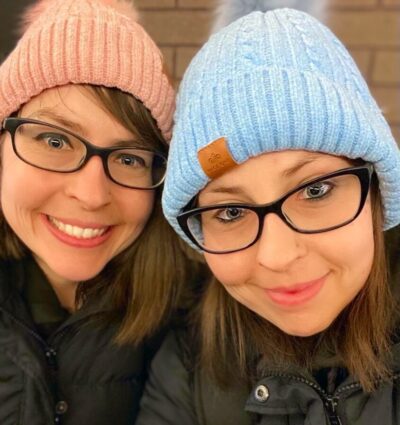Twin sisters seek to make a difference in eating disorders, opioid abuse through neuroscience research
Written By: Rebecca Hoffa, rhoffa@purdue.edu

Melinda and Michelle Karth pose for a photo together in Purdue’s Psychological Sciences Building.Photo provided
Identical twins share a lot with each other: Outside of their outward appearance, they often have many of the same experiences growing up. Doctoral students and twin sisters Melinda and Michelle Karth are no exception.
Arriving in Purdue University’s College of Health and Human Sciences to elevate their psychology research, the sisters have journeyed their entire academic career together. Both earned bachelor’s degrees in media studies and psychology from Penn State University, master’s degrees in media and communications from the University of Leeds, and master’s degrees in experimental psychology from Villanova University.
As the sisters build toward careers that will make a difference in the field of neuroscience, their support for each other has remained a tying thread throughout their education.
“I think academia at any level is really isolating, especially if you’re going to be moving around a lot, and I don’t think I would have been as successful without having somebody who was kind of experiencing the same things I was,” Melinda Karth said. “It’s really helpful to have somebody who doesn’t expect you to have a lot of free time but is still very supportive of you.”
Analyzing anxiety and anorexia

Melinda KarthPhoto provided
Melinda Karth is a graduate researcher in Professor Kimberly Kinzig’s lab in the Department of Psychological Sciences studying the relationship between anxiety and weight restoration in eating disorders such as anorexia nervosa, which often leads to compulsive exercise and abnormally low body weight.
“Lots of people want to figure out why people develop anorexia, but they don’t really look at what happens after somebody is in recovery,” Melinda Karth said. “The thing with anxiety is that a lot of anorexia symptoms can reduce anxiety, so it’s important to understand if people who are recovering have anxiety because that can be kind of a circular effect. If someone is experiencing heightened anxiety during recovery, then they might relapse, and anorexia has a high rate of relapse.”
For Melinda Karth, her research is personal, having previously been a figure skater who struggled with eating disorder symptoms. Because of her experiences and her involvement in the eating disorders community, she hopes to contribute to the knowledge surrounding eating disorder treatments.
“I feel like there are things that haven’t been looked at that I know personally I have experienced,” Melinda Karth said. “I see this in the eating disorders community, people talking about these things, and there’s not a lot of research in this area. I really wanted to explore it more because I think it will be really beneficial for developing new treatments.”
Although Kinzig serves as Melinda Karth’s primary faculty advisor, she also works with Associate Professor Dan Foti to explore the direct application of her research on humans. As part of her dissertation, Melinda Karth is comparing what she’s learning from preclinical models to a survey of Purdue undergraduate students who have struggled with symptoms of anorexia nervosa to gauge their levels of anxiety in young adulthood.
“That is one of the great things about our department,” Melinda Karth said. “There are a lot of collaborations across specializations, and that’s been very beneficial to my research.”
After completing her PhD, Melinda Karth hopes to merge her background in communications with her scientific understanding of eating disorders in the medical communications field. She has already started on this path by contributing to blogs, working with advocacy organizations and appearing on podcasts related to eating disorders.
“I’m really interested in breaking the stigma that eating disorders are simply a choice or that they’re something that feels driven by media influence,” Melinda Karth said.
Uncovering opioid alternatives

Michelle KarthPhoto provided
Prior to coming to Purdue, Michelle Karth studied media depictions of drug and alcohol abuse. Now, as a graduate researcher in Professor Julia Chester’s lab — also in the Department of Psychological Sciences — she focuses more on the mechanisms behind alcohol and drug abuse, exploring pain, sex differences and inflammation and their role in pharmacology.
“I wanted to get a better sense of what was happening neurally, what was actually causing alcohol and drug abuse,” Michelle Karth said. “That’s where I started to drift toward doing more biology-based research.”
Because alcohol and opioids both serve as pain relievers, alcohol and drug abuse often occur simultaneously, Michelle Karth explained. This has been a driving factor in her research investigating pain in alcohol and drug use disorders.
“The co-use of opioids and alcohol is high, and there’s also a high rate of pain in alcoholism, so people will use opioids and alcohol to relieve pain,” Michelle Karth said. “Research shows that people who have a history of alcoholism — they don’t even need to be drinkers themselves — have a higher threshold of pain. When you drink alcohol, that actually acts as a pain reliever, but the more that you drink, your pain level increases, so you have more pain, and you need more and more alcohol to relieve that pain. It’s kind of a cycle.”
Collaborating with Professor Val Watts’ lab in the College of Pharmacy’s Department of Medicinal Chemistry and Molecular Pharmacology, Michelle Karth is currently working alongside Chester to help investigate a drug that could serve as an alternative to morphine. This drug would act like an opioid but not trigger the opioid receptor in the brain, which would allow the drug to be used chronically without increasing tolerance that requires more and more of the drug for the same level of pain relief.
As part of this research, Michelle Karth also hopes to investigate any sex differences associated with this drug and if it can reduce pain threshold in populations with high alcohol dependency.
“I was interested in this research because the lab is moving more toward research on pain as a result of this collaboration,” Michelle Karth said. “I thought it was really novel and exciting because we’re working with this new drug that could potentially be used as an alternative to morphine. Beyond alcoholism, I am also interested in drug abuse, so this was a way for me to marry the two — to not just look at alcoholism but to look at opioid abuse as well.”
In her future career, Michelle Karth hopes to make a difference outside of the lab by working with advocacy organizations to help provide resources and understanding about addiction. She is also interested in potentially pursuing a career in medical communication, science writing or research.
Discover more from News | College of Health and Human Sciences
Subscribe to get the latest posts sent to your email.